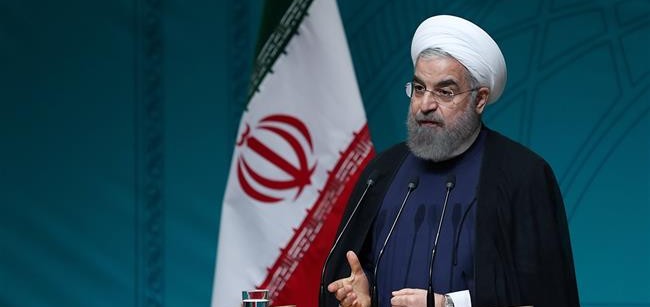Rouhani warns against “economic isolation” amid Supreme Leader’s call for “Resistance Economy”
MONDAY FEATURE
Iran Supreme Court Upholds 5-Year Sentence on Anglo-Iranian Zaghari-Ratcliffe
Campaigning for re-election on May 19, Iran’s President Hassan Rouhani has implicitly challenged the Supreme Leader over the Islamic Republic’s economic approach and engagement with other countries.
Speaking on Sunday in Qazvin in northern Iran, Rouhani declared, “Our nation does not deserve to go back to the times when Iran was in economic isolation.”
Amid ongoing debate over Iran’s foreign relations — especially with the US — after the July 2015 nuclear deal, the Supreme Leader has renewed his call for a “Resistance Economy” of self-sufficiency. In late March, Ayatollah Khamenei gave that title to the new Iranian year.
The state of Iran’s economy is likely to be the primary issue in the Presidential race, with Rouhani’s main challengers — cleric Ebrahim Raisi and Tehran Mayor Mohammad-Baqer Qalibaf — arguing that the Government has not done enough for trade, investment, and employment.
While recovery has been hindered by ongoing US restrictions, affecting much-needed investment from Europe, the President can point to a decline in inflation from more than 40% when he took office in August 2013 to less than 9% now. The IMF projects 6% growth in GDP for Iran this year.
Rouhani offered one example of a shifting trade position in his Sunday speech: “In 2013, we were importing 9 million tons of wheat but in 2016 we reached a place that we are now able to export 3 million tons.”
He added, in a selective view, “We took back our share of the oil market”.
Since implementation in January 2016 of the nuclear deal, Iran has regained about 40% of its oil exports, reaching about 2 million barrels per day. However, further expansion is limited by an OPEC cap on production and sales and by the lack of essential foreign investment in Iran’s oil and gas fields.
Rouhani also set out his supposed achievements in opening up Iran’s political and cultural sphere, despite being limited by the opposition of factions throughout the regime: “We must take steps in preserving citizens’ rights under the cover of the constitution and the Supreme Leader.”
The President continued, “Today, our students and women are participating for Iran’s power and greatness. Our great women deserve to gain their place in their best positions.”
He also covered any attack by opponents on his record over defense, asserted, “In the past 3 1/2 years, we have produced strategic weapons equal to 10 years before.”
Qalibaf Declares Economic Plans
Tehran Mayor Qalibaf met a group of MPs on Monday to unveil his economic plans, emphasizing that these will lower unemployment.
Qalibaf promised the “creation of 5 million jobs” if he wins the election. He said he will set up a national job center system to enrol all applicants looking for jobs across the country.
Iran’s unemployment rate was estimated at 12.7%, or 3.3 million people, in the third quarter of 2016.
The mayor asserted that President Rouhani’s second term would seriously jeopardize the country’s economy.

